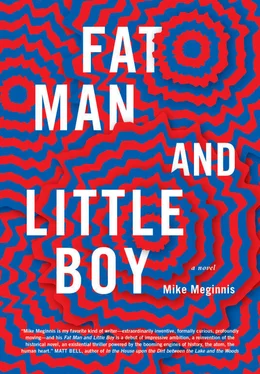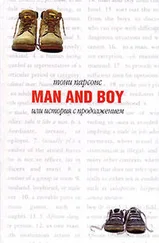Fat Man estimates three days before these women start to show, and after that two weeks until they are bursting, until all their waters break and babies flow. Little Boy points out no one will know it was them, that no one possibly can. They could stay.
“I suppose you enjoy being subjected to the adoring stare of three dozen strange babies everywhere you go.” Fat Man rubs his tired eyes. “How about when they get pregnant for a second time so soon, and they’re birthing some half-formed thing a week later, some hideous child who would be better off dead, and they die in delivery because it’s just too much? I guess you won’t mind that either.”
Little Boy shivers.
“No,” says Fat Man. “You’re right. We’ll definitely stay for that.”
“We’ll leave in two weeks,” says Little Boy, looking at the floor.
“You’re damn right we will. No one asked you anyway.” The waiter comes by with eyebrows raised—do they need assistance? Fat Man waves him away. Or perhaps the waiter swerves that way because he’s come close enough to see the state of their clothing.
“I only wonder how long it’ll last,” says Little Boy.
“Maybe forever.”
Francine comes out of the kitchen with the glow of good news on her face. Fat Man is drawn instead to the sight of her stomach. Perhaps it already bulges with some budding human fruit. It’s hard to tell through the dress, which could slim an ox under the right circumstances. Francine shouts, “You’ve both got jobs.” She seems to believe English is meant to be screamed. She throws her hands up in the air as if to summon a shaft of merciful light from the sky, through the ceiling, and onto the brothers. “John, you’ll wash dishes, and Matthew will sweep the floors.”
“Thank you,” says Fat Man. “What’s the pay?”
“Dreadful,” declares Francine, her tone surrendering nothing to the word’s meaning. “But it’s something. You can stay with us until you’ve set yourselves right.”
“Thank you,” says Fat Man again. “Shall we get to work now?”
The large pile of dishes hidden in a humid closet of sorts behind the kitchen does not seem commensurate to the small number of customers. But then this must be why Fat Man was needed in the first place.
The owner is a thin man in a white shirt with a stiff, bent collar and both sleeves rolled up to just below the elbow. His name is Jacques. He doesn’t know English and he doesn’t know the fat man knows some French, so he points at the dishes and makes a scrubbing motion on an invisible plate. When the fat man doesn’t respond he tries scrubbing harder. Fat Man nods, makes the OK sign, and gets to it.
Coffee stains are tough. There are sick sticky brown rings on all the plates and on saucers, and in the bottoms of the mugs. Tendrils of discolored gunk that overflowed the rims and dribbled down the sides are frozen there, seemingly forever, fixed in place by the things that cream and sugar do together. Worse though is what that coffee makes when it finds sugar. A deposit, a rich vein, like volcanic rock, like shale on a plate, brittle gunk. He scrapes it with butter knives and fork tines. He lets the water run over this, and the cake crumbs collected at its edges, and the pastry flakes, assembled bread bits, and lettuce leaves. He rubs some off with a washcloth, rinses, and then rubs some, but it won’t come loose from the ceramics. Instead it becomes a kind of black-brown scab that runs with greasy water like a sore runs with human juices.
But the worst thing of all is the mold that springs up in the sink, sometimes faster than he can scrub it away and rinse it down the drain, sometimes so fast he can actually see it grow up from nothing into an inch-thick layer of white-green cotton yuck. It sprouts from everything he hasn’t cleaned, all the leftover food and orange peels and cheese rinds. The mold grows to be near him. Where he touches the dishes, it rises to meet him, reaches out, or grows up, and reaching for him seems to seethe, and seething hums with energy he knows without knowing what it is.
Any meat he finds he picks up with a fork and hurls into a garbage bag before the hungry white worms come.
Fat Man asks the owner if they have to pay for meals. Jacques explains that he doesn’t know English—explains it in French. Fat Man tries to ask him in French, then, but Jacques has already left the room. Several hours later he comes back with half a loaf of bread and a bit of roast beef for the fat man. “You looked hungry,” he says, though not, of course, in English. The fat man nods. He is always hungry. He eats the beef first, and though he feels a faint tickle in his mouth on swallowing the last morsel, he assures himself no worms have grown. Next he eats the bread. There are two mold handprints in the crust when he’s finished. It feels alive.
Little Boy knows little French. He likes it this way. He is sweeping the restaurant’s floors. Conversation hangs shimmering over his head like thick, moonlit fog over a highway, or orbiting planets. He makes no effort to discern the meaning or mood of these exchanges, and because the restaurant grows busier as the day advances there is little risk of differentiating prattle from chatter, verb from adverb, idle talk from debate. There is only the continuous rattle, an eternal phoneme, spit-flecked.
If he should find himself sweeping next to some confiding, sweet-whispering old lady, her skin spotted with after-marks of hungry rations, her teeth patchy and many gone, her hair thin beneath the tightly tied emerald-green kerchief she wears like a disguise. If he should find himself sweeping beside her, and she should put some treat in his mouth, thumbing it past his lips and his own aching hungry teeth. If this should happen, then that’s okay, and who cares why, or what she whispers in his ear, or how she calls him, or whether he is rude because he doesn’t answer, or whether she expects an answer or does not.
About one in four people leave something behind when they leave a restaurant. One in three times it’s only some food they meant to take home. One in three times it’s an object of small value. One in three times it’s a bit of cash, or something of real value: a good watch, a set of cufflinks, a gold chain, or some such. The first category can be eaten. The second and third can be pawned.
When someone leaves Little Boy does what he can. This means cleaning and thieving—what he can do is often both. If someone sees him they don’t say a thing, and if they did say a thing he wouldn’t know they said it, and so he could stare back at them blank and blameless as a tea light. What could they say?
He doesn’t know what they could say.
If it’s food he’s taking from their table then it isn’t really stealing, since the alternative is throwing it out. He brings it to Fat Man or he eats it himself. If it can be pawned, he puts it in his pocket, or brings it to Fat Man if it’s too large. These are his brother’s instructions.
A couple calls him to the table, or seems to call him. They wave at him. They’re young and he’s wearing an eye patch. She’s always touching him with one hand or both. They’re married or young lovers. They speak French like they are blowing smoke rings. Little Boy nods when they want him to nod. The girl musses Little Boy’s hair. Her sleeves are ruffled, as is her dress. The girl tweaks his cheek. He giggles, perhaps coos. This must be what it’s like for babies before adults make them learn to listen and speak. His own sounds are part of the language cloud apart from Little Boy himself; he can hardly feel them in his throat, can hardly hear them at all.
He feels happy like a baby. He feels simple and empty, like Hiroshima without all the people and rubble. The young couple is looking away from him so he drifts away from them and sweeps a corner of the floor. To live without language is like living in the time before Fat Man, when nobody knew who he was, or what. If he wasn’t happy then it wasn’t the silence that made him that way. It was the environment and what destroyed it. No one could be happy in a place like that.
Читать дальше












